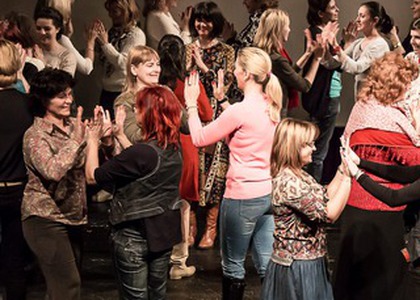> [Archived] Interviews

Interview with Oana Cosmovici
Between March 14th and 15th, 2020, the Gabroveni Inn in Bucharest will host a Dalcroze seminar held by Professor Jean-Marc Aeschimann for professionals in the fields of music, dance, acting, therapeutics and pedagogy. More details about this seminar were offered by the director of the "Culture through music" association, Mrs. Oana Cosmovici.
This Dalcroze seminar will once again have Jean-Marc Aeschimann as guest, one of the most important professors at the Dalcroze Institute in Geneva. What kind of approach will he adopt in regards to disciplines such as rhythm, solfeggio or musical improvisation?
It will adopt the same approach as last time, the one characteristic of the Jaques Dalcroze active musical method, respectively through body movement. This is the basis of this musical method and therefore the reason why it is very adaptable to several professional categories.
The fact that Professor Jean-Marc Aeschimann returns to Bucharest demonstrates an increased interest of the personnel in the field of education for the Dalcroze method. What do you think attracts them to this method?
I reckon what attracts them is exactly its very active part and a slightly different understanding of some notions already learned in music schools in Romania or in neighboring countries, because this time we have participants from the Republic of Moldova, as well, for example, who come to this seminar. It is a new approach for us, those in this area and, from the experience of the past seminar, I can say that it really brings a different understanding; I do not say of a better quality, but another understanding, an enrichment of a professional experience that the participants already have and which they now have the opportunity to diversify, to enrich and to take to other fields of interest and of musical applicability.
As you said, the seminar is aimed at several professions, starting from music teachers, dancers, actors and reaching social workers. How can the Dalcroze method be applied to various areas?
First of all, it is a method that is very personal, because in this method you use the body and the emotions that are personal. And then, the discovery is personal. Surely that there are benefits that you can list objectively, but each one will have its own impact. I do not think that such a context in which people come from various professions to practice music in such a context of continuous training has been seen before.
The "Culture through music" Association organized many such seminars, including the Kodaly method. Have you already planned the next seminar and the method it will focus on?
Of course! Apart from the Dalcroze seminar in Bucharest, which is still of particular importance because during the seminar we will also present a continuous training that we intend to launch in Romania, namely CAS Dalcroze (Certificate of Advanced Studies Dalcroze), a training proposed by the Jaques Dalcroze Institute in Geneva exactly in the formula that they carry out within the institute in Geneva and implemented here, in Romania, with the help of the "Culture through music" Association. This presentation will take place in the seminar and that is the reason why this seminar is a little more special to us. Otherwise, in March we have a Kodaly seminar in Câmpulung, which is addressed to educators and teachers, with a Kodaly specialist teacher who will work on the requirements of this professional category. We have another one scheduled in April, also Kodaly, which will take place this time in Bucharest, within the Balassi Institute, the Hungarian Institute in Bucharest. And, of course, our collaboration, which has already been with the school inspectorate in Braila for two years, for a Dalcroze seminar in March and an Orff seminar in May, which is also aimed at educators and teachers.
Translated by Drangoi Ioana – Alexandra, Universitatea București,
Facultatea de Limbi și Literaturi Străine, MTTLC, anul I














